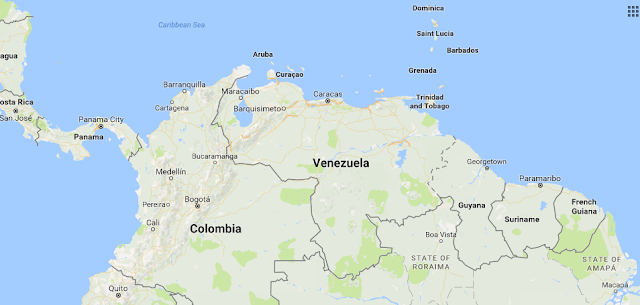Guyana faces elections amid oil boom, Maduro's threats
Aug. 14 (UPI) -- With less than three weeks before Guyana's general elections Sept. 1, Venezuelan President Nicolás Maduro has intensified his rhetoric over a long-standing territorial claim to the Essequibo, a region that makes up more than 60% of Guyana's territory and that Caracas claims as its own.
The region bordered by Venezuela on the west, Brazil on the southwest and the Atlantic Ocean on the north: It contains dense rainforests, highlands, savannas and low coastal plains.
In his weekly address Tuesday, Maduro said Venezuela "will recover the Essequibo sooner rather than later," a statement that heightens diplomatic tensions at a sensitive moment for the English-speaking nation, which is preparing to elect a new parliament and president amid an unprecedented oil boom and growing regional polarization.
"No matter what ExxonMobil, imperialism or the International Court of Justice do, the Essequibo is and will be Venezuela's," the Venezuelan president said, firmly rejecting any ruling from the Hague-based court.
While such remarks are not new in Venezuela's official rhetoric, they come as Guyana gains international prominence thanks to the rapid development of its oil industry in the offshore area adjacent to the Essequibo.
Major companies such as ExxonMobil, Hess and CNOOC operate there under concessions challenged by Caracas.
Guyana President Irfaan Ali, seeking re-election with the People's Progressive Party/Civic, has avoided direct confrontations with Venezuela, but has firmly defended Guyanese territory before the international community.
The country has brought the dispute before the international court since 2018 and has reiterated its willingness to accept the court's ruling as binding.
The case is moving forward in The Hague, with hearings held in April. Venezuela continues to reject the court's jurisdiction, while Guyana's government has received diplomatic backing from Caribbean nations, the Commonwealth, the United States and the Organization of American States.
"The sovereignty of the Essequibo is not at stake. Guyana is committed to the peaceful resolution of the conflict in accordance with international law," the Ministry of Foreign Affairs said recently.
Analysts say the Venezuelan government may be using the territorial claim for electoral purposes as it faces international sanctions and the recent U.S. announcement of a $50 million reward for information leading to the arrest and/or conviction of Maduro.
U.S. Attorney General Pam Bondi accused him of working with criminal organizations, calling him one of the world's most dangerous drug traffickers and a threat to U.S. national security.
By contrast, for Guyana, defending the Essequibo is a matter of national unity. In 2023, after a consultative referendum promoted by Maduro -- in which Venezuelans backed creating a state called "Guayana Esequiba" -- the Guyanese government strengthened its diplomatic strategy and stepped up its appeals at the United Nations.
Guyana's political climate remains tense but stable, with seven parties registering candidates for the elections. The vote will be monitored by missions from the European Union, the Caribbean Community, or Caricom, and the Carter Center, which already has personnel deployed across the country.
The Essequibo has not dominated the campaign debates, which are focused instead on economic development, equitable access to oil revenues and the fight against corruption.
Guyana is undergoing an unprecedented economic transformation, driven by a surge in oil production. In 2024, the economy grew 43.6%, with the oil sector expanding 57.7% and the non-oil sector 13.1%.
The International Monetary Fund projects average annual growth of 14% over the next five years, supported by stronger infrastructure and higher productivity, with non-oil GDP expected to grow about 6.75%.
On the oil front, Guyana has begun production from its fourth floating production, storage and offloading unit, boosting capacity to more than 900,000 barrels per day -- already surpassing Venezuela's current output -- with a goal of reaching between 1.3 million barrels by 2027 and up to 1.7 million by 2030.













